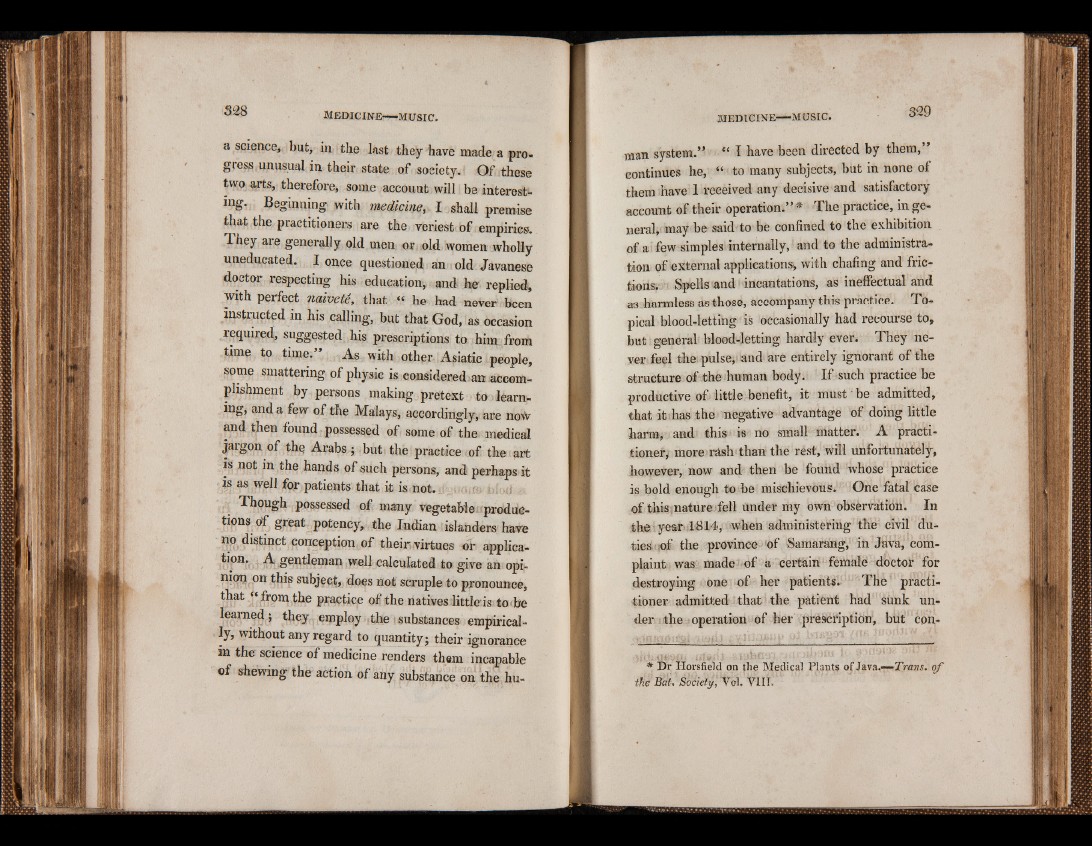
a science, but, in the last they have made a progress
unusual in their state of society. Of these
two arts, therefore, some account will be interest
ing... Beginning with medicine, I shall premise
that the practitioners are the veriest of empirics.
They are generally old men or old women wholly
uneducated. I once questioned an old Javanese
doctor respecting his education, and he replied*
with perfect naivete, that « he had never been
instructed in his calling, but that God, as occasion
required, suggested his prescriptions to him from
time to time.” As with other Asiatic people,
some smattering of physic is considered air accomplishment
by persons making pretext to learn-
ing, and a few of the Malays, accordingly, are no#
and then found possessed of some of the medical
jargon of the Arabs ; -but the practice of the art
is not in the hands of such persons, and perhaps it
is as well for patients that it is not. ih&wm idod
Though possessed of many vegetable-productions
of great potency, the Indian islanders have
no distinct conception of their virtues or application.
A gentleman well calculated to give an opinion
on this subject, does not scruple to pronounce,
“ from the practice of the natives littleisi to be
learned j they employ the ¡substances empirically,
without any regard to quantity j their ignorance
in the science of medicine renders them incapable
of shewing the action of any substance on the human
system.’* “ I have been directed by them,”
continues he, “ to many subjects, but in none of
them have 1 received any decisive and satisfactory
account of their operation.” * The practice, in general
» may be said to be confined to the exhibition
of a few simples internally, and to the administration
of external applications» with chafing and frictions.
i Spells and incantations, as ineffectual and
as harmless as those, accompany this practice. Topical
blood-letting is occasionally had recourse to,
but general blood-letting hardly ever. They never
feel the pulse, and are entirely ignorant of the
structure of the human body. If such practice be
productive of little benefit, it must ' be admitted,
that it has the negative advantage of doing little
harm, and this is no small matter. A practitioner*
more rash than the rest, will unfortunately,
however, now and then be found whose practice
is bold enough to be mischievous. One fatal ease
of tliis nature fell under my own observation. In
the year 1814, when administering the civil duties'
of the province of Samarang, in Java, complaint
was made of a certain female doctor for
destroying one of her patients. The practitioner
admitted that the patient had sunk under
the operation of her prescription, but cpn-
* Wi Horsfield on the Medical Plants of Java.—Trans, o f
the Bat, Society , Vol. Vi IT.